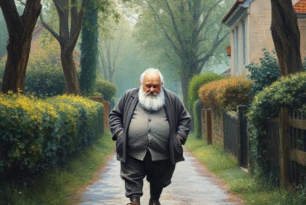There’s a moment — often quiet, sometimes frustrating — when you realize your body doesn’t respond the way it used to. You eat the same meals, move the same way, maybe even cut back a little more than you did in your thirties or forties… and yet, the scale barely budges.
You try to brush it off. Age, metabolism, hormones — we all know the buzzwords. But it doesn’t make it any less discouraging when your effort seems to outpace your progress. And if you’ve ever whispered to yourself, “Why is this so hard now?” — you’re not alone.
Because it is harder. And there are good reasons for it.
The body changes with age — not just on the surface, but deep within. Muscle mass starts to decline in your 30s and 40s and continues at a slow, steady pace unless you actively work against it. Less muscle means a slower metabolism. It’s not your fault. It’s biology. Your body just doesn’t burn calories as efficiently anymore.
Then there’s hormones — especially for women, who may find that menopause completely rewrites the rules of weight management. Estrogen drops, fat redistributes, cravings shift, sleep becomes more fragile. And for men, testosterone levels decline too, bringing their own set of challenges. The body becomes more insulin-resistant, meaning sugar is stored more easily as fat, especially around the belly.
Sleep gets trickier, too — and poor sleep messes with appetite-regulating hormones. You wake up groggy, your cravings shout louder, and your energy to prepare a healthy meal or go for that walk is lower. Fatigue becomes a barrier — and so does stress. Because life doesn’t necessarily get simpler with age. There are responsibilities: jobs, caregiving, grief, transitions. Emotional weight that sits quietly alongside the physical kind.
And then, there’s this subtle, cruel irony: the methods that worked in your younger years often stop working. You might remember cutting carbs once and watching the pounds melt off. You might remember doing aerobics in your living room and feeling lean and powerful. But now, it’s different. Now your body seems to hold on tighter — to calories, to fat, to fatigue.
But here’s the thing no one tells you: it’s not a personal failure. It’s a natural shift.
Losing weight when you’re older isn’t impossible — but it is different. It’s slower. It demands more patience, more intention, more compassion. It may require a pivot from focusing purely on the number on the scale to paying attention to strength, energy, blood sugar, sleep quality, joint health, and mood.
And maybe — just maybe — the goal becomes less about being smaller, and more about being well. Strong. Balanced. Comfortable in your skin, even if it carries more softness than it used to.
The truth is, aging is a privilege. Not everyone gets to do it. And while the path to weight loss may be slower or steeper, it can still be meaningful. You’re not working with the body you had at 25 — you’re working with the one that’s carried you through decades. So, no, you’re not imagining it. It is harder to lose weight when you’re older.
But you’re also wiser now. You know your rhythms. You know what matters. And maybe, with a shift in perspective, the journey becomes less about fighting your body — and more about learning to support it, as it is now.




